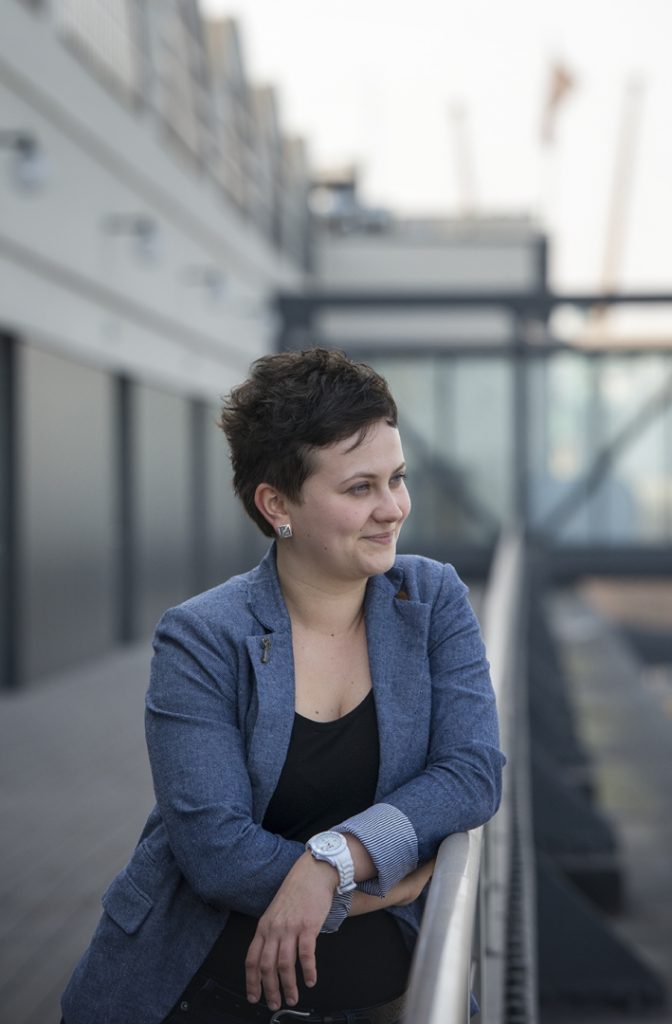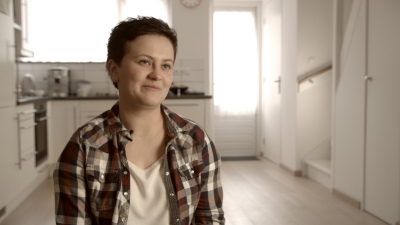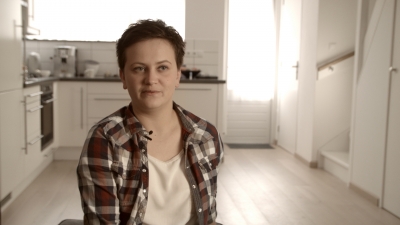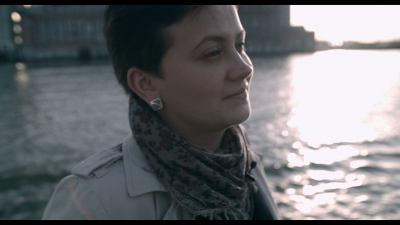
Agnieszka Imbierowicz was born on 28th October 1987 in Rawicz. At the age of 19 she went on holiday to London to visit her brother. She decided to try her hand and stayed in the UK for a while. While living in London she began studying Sociology at the University of Wrocław. She came to Poland every two weeks to participate in classes, while working in the UK.
After two years she came back to Poland to continue her education at the faculty of Pedagogy. Every year she visited Holland with her friend. She did that to experience adventure, work and survival at the same time, as she says herself. During one of such travels she met Rob, her current partner. He was the reason she decided to move to Amsterdam. She started an intensive course of Dutch and she commenced studies to be able to live in Holland without any impediments.
So far Agnieszka has not been thinking about going back but she is open to various options.
Interviewed by Olga Blumczyńska in May 2015 in Amsterdam.

Lesson of self-confidence
I suppose that some things I would have done differently, now that I look at this from a perspective. But also my attitude towards work back then, regarding searching for work in England, was that I assumed, in a way, that I would not find anything ambitious, nothing I would like to do. But I felt insecure, I saw myself as a girl from Poland, from a small city, and I thought, for example, that my English was not good enough. I think that, objectively, it was ok, but I was blocked by this thought that it was not worth trying, not worth the shame. So I assumed that I could do anything, something easy, something that would not require any qualifications. So I started searching for work only in this Polish circle, and I worked for two and a half years cleaning these English hotels, and doing some other temporary jobs, in the meantime there was also the university. It all kind of happened. And until the very end, it's surprising even for me, I did not think, for example after a year, ok, now let's go more in the direction of what I would like to do, something more ambitious, for example regarding the work, I was only stuck in this feeling of temporariness, that I was there in England, but sooner, or later I would go back, so it was not worth the effort, I would fail anyway. So that's partially why, at one point, I decided that it was time to go back. And this is a lesson for the future – when I was already living here, at a certain point I started having a different approach to many issues, for example language learning, exploring the benefits of culture – having in mind this experience from England and the mistakes that I committed back then, I think that I could have approached some things differently.
I suppose that some things I would have done differently, now that I look at this from a perspective. But also my attitude towards work back then, regarding searching for work in England, was that I assumed, in a way, that I would not find anything ambitious, nothing I would like to do. But I felt insecure, I saw myself as a girl from Poland, from a small city, and I thought, for example, that my English was not good enough. I think that, objectively, it was ok, but I was blocked by this thought that it was not worth trying, not worth the shame. So I assumed that I could do anything, something easy, something that would not require any qualifications. So I started searching for work only in this Polish circle, and I worked for two and a half years cleaning these English hotels, and doing some other temporary jobs, in the meantime there was also the university. It all kind of happened. And until the very end, it's surprising even for me, I did not think, for example after a year, ok, now let's go more in the direction of what I would like to do, something more ambitious, for example regarding the work, I was only stuck in this feeling of temporariness, that I was there in England, but sooner, or later I would go back, so it was not worth the effort, I would fail anyway. So that's partially why, at one point, I decided that it was time to go back. And this is a lesson for the future – when I was already living here, at a certain point I started having a different approach to many issues, for example language learning, exploring the benefits of culture – having in mind this experience from England and the mistakes that I committed back then, I think that I could have approached some things differently.

Little big tests
I think that a departure is always a step out of our comfort zone. Also, it was a double step out of my comfort zone, because it was my first time searching for job, so these two factors combined together. But it was, on one hand, curiosity and a test for myself and a time of reflexion whether I could manage, because I think that when you are abroad, all the simple things such as finding a job, an apartment, or even, I don't know, figuring out the city transport, these things seem super basic, but abroad they become small tests of resourcefulness. So it was interesting, wondering how it all would work out, whether I could pass the test. All the emotions also play a role, and they are very intense for sure. I think that this is the specificity of this situation of being abroad, that you experience everything with more intensity, because you don't have this backup of your family, friends, of hearing your own language on the streets. It is discovering the small things, my reactions to how I cope with different situations. Starting with these simple examples as, I don't know, going grocery shopping in a place where you don't know the language. I remember one of my first times I went grocery shopping, I was practically rehearsing the line I would say in a moment in this shop to ask for example for two kilos of tomatoes and one kilo of potatoes, this kind of thing. And then, the sense of pride, that I did the job and that I understood what the lady replied to me, she understood me and I brought back these potatoes and tomatoes back home. These small things that would make me happy because I accomplished something on the level of, I don't know, a 5-years old, that suddenly grow to a higher rank.
I think that a departure is always a step out of our comfort zone. Also, it was a double step out of my comfort zone, because it was my first time searching for job, so these two factors combined together. But it was, on one hand, curiosity and a test for myself and a time of reflexion whether I could manage, because I think that when you are abroad, all the simple things such as finding a job, an apartment, or even, I don't know, figuring out the city transport, these things seem super basic, but abroad they become small tests of resourcefulness. So it was interesting, wondering how it all would work out, whether I could pass the test. All the emotions also play a role, and they are very intense for sure. I think that this is the specificity of this situation of being abroad, that you experience everything with more intensity, because you don't have this backup of your family, friends, of hearing your own language on the streets. It is discovering the small things, my reactions to how I cope with different situations. Starting with these simple examples as, I don't know, going grocery shopping in a place where you don't know the language. I remember one of my first times I went grocery shopping, I was practically rehearsing the line I would say in a moment in this shop to ask for example for two kilos of tomatoes and one kilo of potatoes, this kind of thing. And then, the sense of pride, that I did the job and that I understood what the lady replied to me, she understood me and I brought back these potatoes and tomatoes back home. These small things that would make me happy because I accomplished something on the level of, I don't know, a 5-years old, that suddenly grow to a higher rank.

A desire to be understood
This is painful. When it comes to expressing oneself in Dutch, or in any foreign language whatsoever, it’s always that... well, I don’t know. Especially, when you put attention to speaking and, at the time, you have this feeling that you cannot express yourself the way you wanted, the way you can express yourself in your mother tongue. And there is always this insufficiency and the feeling that you could have said that better so it’s definitely different. With Dutch there is this problem, at least in my case, that I really believe that it reflects the mindset and the culture. And sometimes this culture and the language expressing it, it seems to me to be too crude, too direct, lacking finesse or something like that... It's too hard and... I don’t know, it does not reflect all the shades, all the emotions, it’s just too black and white. Maybe it will change with time when I’ll learn a bit more. However, I still feel that I’m not speaking fluently. I can communicate well but the nuances, those shades of grey, are very difficult to express in a foreign language.
This is painful. When it comes to expressing oneself in Dutch, or in any foreign language whatsoever, it’s always that... well, I don’t know. Especially, when you put attention to speaking and, at the time, you have this feeling that you cannot express yourself the way you wanted, the way you can express yourself in your mother tongue. And there is always this insufficiency and the feeling that you could have said that better so it’s definitely different. With Dutch there is this problem, at least in my case, that I really believe that it reflects the mindset and the culture. And sometimes this culture and the language expressing it, it seems to me to be too crude, too direct, lacking finesse or something like that... It's too hard and... I don’t know, it does not reflect all the shades, all the emotions, it’s just too black and white. Maybe it will change with time when I’ll learn a bit more. However, I still feel that I’m not speaking fluently. I can communicate well but the nuances, those shades of grey, are very difficult to express in a foreign language.

Polish, despite everything
I think that whenever I'm asked the question "Who are you?", I will always reply that I am from Poland. Because I left when I was already 20 years old and at that point I think that this was the country that formed me. This is the country where I have my family, where I made the first friends, where I grew up. I think that this first stage of life is so important that wherever I would go and stay for, let's say, 20, 50 years, I don't think I would be able to say that I was for example Dutch, because I don't feel I am. I feel Polish and I think I always will. I also think that here, after all, they will always think of me as a Pole. A Pole that got, for example, integrated, assimilated, whatever you want to call it, but, despite everything, a Pole.
I think that whenever I'm asked the question "Who are you?", I will always reply that I am from Poland. Because I left when I was already 20 years old and at that point I think that this was the country that formed me. This is the country where I have my family, where I made the first friends, where I grew up. I think that this first stage of life is so important that wherever I would go and stay for, let's say, 20, 50 years, I don't think I would be able to say that I was for example Dutch, because I don't feel I am. I feel Polish and I think I always will. I also think that here, after all, they will always think of me as a Pole. A Pole that got, for example, integrated, assimilated, whatever you want to call it, but, despite everything, a Pole.



